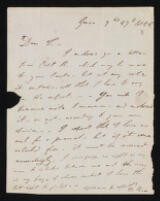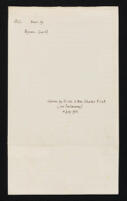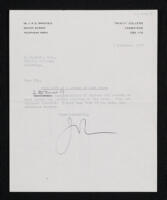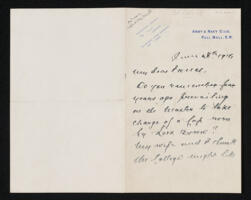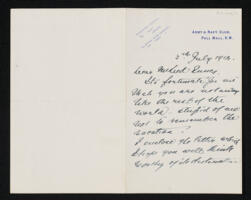Genoa.
Florence. 6 Lungarno Torrigiani. 1ᵒ pᵒ [primo piano]. Envelope addressed to Browning at 19 Warwick Crescent, Upper Westbourne Terrace, London. - Death of Miss Isabella Blagden; attended her funeral yesterday; she had been slightly unwell since her return from England this winter. She 'has not ceased to live, as Bibi [his daughter Imogen] and I know, for we have had tidings of her through Regina, whom you remember' [Kirkup was a spiritualist and believed that he remained in communication with his first wife Regina, who died in 1856].
Isabella Blagden is buried near Browning's wife, south of her monument, 'the most magnificent in the place'. Remembers that Browning was dissatisfied in some way with 'Mr Leighton's part in the erection' but not 'in what way it was imperfect'; assures Browning that 'its general effect is imposing'.
Further discussion of spirits: they are 'alive & kicking - that is, flying with their legs, as I have often dreamed - none of our spirits have wings. They are like my master Fuseli's angels, who float by Will, not by wings'. Has 'obtained four photographs of spirits, real ones, not artificial imitations, which wd have been perfectly impossible with my precautions'.
Has much to tell Browning but cannot write or read for long; has parted with his books, 'besides, thieves had begun to steal the most valuable'. Has had to leave his old house as his landlord wanted to live there and has 'altered it and spoiled it'; his new house is 'prettier' with a 'much finer prospect. I see the Cupola as I lie in bed'. Invites Browning to visit him before he moves in May to Leghorn [Livorno], on the instructions of Isacco [a spirit]. Bibi is as tall as Regina was; has had her legitimised 'at Regina's pressing request' and she is now a 'courtesy Baroness... all vanity!'
Asks how [Browning's son] 'Penino' is; also enquires after Robert Lytton, Henry Layard, 'the poet Wilberforce' and Frederick Locker. Asks who 'Mr Addington Symonds' is: he has sent Kirkup his book on Dante. Asks whether Miss [Fanny?] Haworth is married. Never sees the Landors: gives news of 'Carlino' [Charles], Walter, and Julia. [Thomas] Trollope has 'been obliged to sell his villa, books & every thing - he had married his daughter's governess'; believes they are all in England [in fact they had moved to Rome]. Florence is 'much changed & immensely increased - millions on millions spent in building when it was the capital'; now 'no English' there.
Signs off, but adds a long postscript: spiritualism ('Spirits are almost my only friends here'); does Browning see the Rossettis or Trelawny? Discusses Lady Westmorland and her family, and Lady William [Russell?]. Has received two copies of Forster's life of Landor; wonders if he can send one back. Hates the Florentines 'for their treatment of Dante's monuments'; asks if Browning has a copy of the Arundel Society reproduction of Kirkup's sketch.
Harts, Almondsbury, Bristol. - Thanks Bob for sending her his poem ["A Dream"]. Her sister read it twice before she had a chance to see it. Asks if Bob has copies for sale, as she would like a few to send to friends; thinks it 'one of the best things' he has written, on a level with his 'letter to Goldie [Lowes Dickinson]'. Asks what his other friends think of it. His 'powers do not decay', though he 'often scratch[es] his head' and says he does not know what to do. The reconciliation of Lucifer and Christ seems original and interesting; must read "Par[adise] Regained" again. Wishes she could see Bob and talk to him. Finds Lady Bessborough and her family letters 'fascinating', as is everything that 'gets near Byron'; the letters are 'newly published by Lord Bessborough' ["Lady Bessborough and Her Family Circle"], and inspired her to [re-?] read and enjoy Byron. Has also read a new biography of [Edward] Trelawny [by Margaret Armstrong?]. 'That lot and the Wordsworth-Coleridge group never grow stale'. Heard 'scraps of a talk on Hazlitt' by ? on her 'very bad wireless' recently; wishes more of such talks were broadcast.
(Labelled, ‘1822 Nov. 29 | Byron (Lord) | Given by Lt-Col. & Mrs Charles F. Call | (née Trelawney [sic]) | 10 July 1912’.)
216 L.A.A. Bty. R.A., 151 Castle Boulevard, Nottingham. - Thanks Trevelyan very much for lending him "Pinocchio" [in Italian, as requested in 4/117] which is just right as he knows the story; still thinks the easiest Italian is Dante's. Is going to try Margaret Armstrong's biography of Trelawney: knows he was 'an awful old rascal' but Shelley liked him. Is lecturing to the troops on current affairs; finds it amazing 'how indifferent they are to news of any kind': none of them had heard of the Atlantic Charter.
Palace Hotel, Rome. - Sir George is much better; at first his leg seemed to have 'lost all power' and they were very uneasy, though the doctor said there was no injury to bone or muscle; it turned out to be largely rheumatism and the 'vigorous measures' they took against this have succeeded. Expect now to be able to start for home on 28 Deccember as planned; they will stop at Bologna, Lugano, Bale [Basel], Paris, and hope to be home on 4 January. Glad to hear what a good time Elizabeth and Robert are having; Aulla [home of the Waterfields] must be 'delightful', especially in 'this glorious weather'. Thinks the Tuscan people 'attractive... & very superior to the South Italians'. Hopes the 'Xmas festivity' will be successful. She and Sir George thought Robert's observation about Charles very good. Envies Elizabeth reading Hogg [Life of Percy Bysshe Shelley, see 46/113] for the first time; thinks it 'one of the most amusing of books'. Suppose she knows [Edward?] Trelawny. She and Sir George have finished Pepys, and are beginning Keats's letters again. The Com[mitt]ee do not seem to have collected enough to buy the house in Rome Keats died in yet, but she thinks they hope to do so. Asks to be remembered to Elizabeth's hostess [Lina Waterfield], whom she remembers meeting at the Mill House.
Trinity College, Cambridge.—Sends two letters relating to a letter of Byron given to the College in 1912 (R.2.40A/10).
—————
Transcript
Dr J. R. G. Bradfield, Senior Bursar, Telephone 58201
Trinity College, Cambridge, CB2 1TQ
9 November, 1970
P. Gaskell, Esq.,
Trinity College,
Cambridge.
Dear Pip,
1912 Gift of a letter of Lord Byron
In the course of {1} reorganization of various old records we came across two letter relating to the above. They are enclosed herewith. Please keep them if you wish, but otherwise destroy.
Yours sincerely,
JB {2}
—————
Typed, except the initials and a correction.
{1} ‘In the course of’ above ‘Continuing’, struck through.
{2} The initials are indistinct.
Army and Navy Club, Pall Mall, S.W.—He and his wife propose to present to the College a letter from Byron to Trelawny (R.2.40A/10), to be put with the cap sent four years earlier.
(The cap is still in the College’s possession.)
—————
Transcript
Army & Navy Club, Pall Mall, S.W.
June 28th. 1912 {1}
My dear Innes,
Do you remember four years ago prevailing on the Master to take charge of the Cap worn by Lord Byron?
My wife and I think the College might like to possess and place with it, a characteristic letter from the poet to Trelawny.
I hope all is well with you & yours, our kind regards to Mrs. Innes
I have not forgotten having tea with her on the bowling alley green
Yours sincerely,
C. F. Call
—————
McLeod Innes has written at the top, ‘Ans[were]d 1.vii.12 | confident College delighted’, and another person has added in pencil, ‘Col. Call’s gift’.
Army and Navy Club, Pall Mall, S.W.—Sends the letter mentioned in his previous letter (R.2.40A/17), with a donor’s card from his wife.
—————
Transcript
Army & Navy Club, Pall Mall, S.W.
3rd. July 1912.
Dear McLeod Innes.
Its fortunate for me that you are not away like the rest of the world—stupid of me not to remember the vacation!
I enclose the letter which I hope you will think worthy of its destination
My wife is not sure if she sent a donor’s card with the cap; so I enclose one, as its use will gratify her, and it will serve for both.
Yours sincerely,
C. F. Call
Usk, Monmouthshire. - Glad Milnes likes his book [Recollections of the Last Days of Shelley and Byron]. No mistake about Byron's 'unfortunate feet': he bathed in trousers and used only his arms when fencing or boxing; subsequent dispute as to which leg was lame; Trelawny knew both were affected but only learned cause after Byron's death; malformation of the feet affected Byron's health and caused the morbid sensitivity in his temper and verse.
